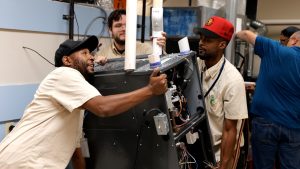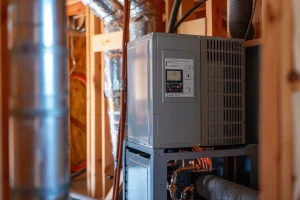How Long is HVAC School? A Comprehensive Guide to Becoming an HVAC Technician
If you’re thinking about becoming a heating, ventilation, and air conditioning (HVAC) professional, you are also probably thinking about the amount of training and education needed to get there. A question that comes to mind often is this one: How long is HVAC school? The answer will be different depending on the type of course you enroll in, your target career, and the licensing requirements of the state you intend to practice. HVAC is a skilled trade and getting to be an HVAC technician can be done through different paths. However, each path has its own timeline.
In this blog, we’ll discuss different HVAC educational programs, their duration, and what to anticipate from this training. At Summers Comfort Heating & Air, we think that one of the more important factors for preserving comfort and air quality is a competent HVAC technician, and we’re here to assist you towards a rewarding career in this essential industry.
The Nuts and Bolts: What are the Duties of an HVAC Technician?
Having a very deep understanding of the duties of HVAC Technician may not be necessary before detailing the program offered in HVAC school, but it does come in handy. The HVAC technician is the person who carries out the installation, maintenance and repair of the heating and cooling system as well as the ventilation system in all types of buildings whether residential or commercial or industrial. There is heavy reliance on both technical and practical skills when working with such systems, which makes HVAC a very specialized kind of trade.
As HVAC systems also play a great role in indoor comfort and air quality, there are, quite reasonably, a number of specialized areas technicians have to be competent in, including, but not limited to, electrical work, refrigeration, plumbing and mechanical systems. Given the scope of work involved, comprehensive training is essential for anyone interested in entering the field.
How Long Does It Take to Become an HVAC Technician?
To complete schooling for an HVAC program and become an HVAC certified technician takes a long time, however, the duration completely depends on the type of program one opts for, as well as the level of skills they wish to acquire. Below is a rough estimate for the different training options that are available:
Certification Or Diploma Programs – 6 Months To 1 Year Associate Degree Program – 2 Years Apprenticeships – 3 To 5 Years (usually involves constructive learning in classrooms) On-The-Job Training – As per Company policies and individual’s aspirations Each path has its own merits and demerits, and the one you select will be based on your career goals, time available and finances.
Certificate or Diploma Programs (6 months to 1 year)
The certificate or diploma programs are the best and fastest approaches to enter the HVAC industry. Usually these programs are offered at vocational schools or through community colleges which lean towards basic skill sets required for employment in the HVAC field.
How Long Does It Usually Take:
Historically the duration for completion of these programs is about a time frame of six months to a year depending on the type of mode attended, whether or not it is part time or full time.
The coursework includes the basic components of HVAC systems, thermodynamics, principles of refrigeration, electrical items, safety measures and practical classes on troubleshooting and repairs.
Most programs combine lectures with practical instructional sessions in either simulated settings or workplaces.
Advantages:
Fast Access: With a certificate program, employment is possible sooner rather than later.
Value For Money: The cost of certificate programs is much less compared to other degree programs.
Employment Opportunities: The gap theory would mean that students are able to will be employed in junior HVAC positions and further learn through employment and experience.
Drawbacks:
Narrow Range: Students who only enroll in certificate programs mainly learn basic HVAC concepts and thus may lack a desirable edge to gain more specialized skills or even move up the ranks without obtaining more education or training.
Licensing Requirements: In some states, written licensing tests such as EPA Section 608 certification need to be fulfilled in order to be authorized to work with refrigerants.
Associate Degree Programs (2 years)
If you are looking for a more detailed education then you can add an associate degree in HVAC technology, as it will automatically become your good choice. Usually, associate degree programs are offered at technical schools and community colleges, and have more subjects than certificate programs.
What to Expect:
Completing the associate degree programs typically takes around 2 years assuming the individual is a full-time student.
The coursework includes general education subjects such as mathematics, physics, and communication as well as core HVAC courses.
Students are also prepared in a lab setting and students are required to undertake an internship so as to implement their skills in the field.
Advantages:
Broader Knowledge Base: The associate degree in hvac is an all rounded program therefore students gain technical and theoretical knowledge on hvac works.
Higher Earning Potential: Technicians with an associate degree will have better chances of being employed in positions that pay better than those with only a high school diploma.
Specialization Opportunities: A few of the associate programs also allow students to take electives such as addresses energy efficiency, commercial refrigeration and environmental.
Drawbacks:
Time Commitment: An associate program will take longer than a certificate program which may be unappealing to those who intend to get into employment as fast as they can.
Higher Cost: The reason as to why an associate program is more expensive than a certificate program is due to the fact that it takes a longer duration.
Apprenticeships (3 to 5 years)
An apprenticeship brings together work education that is paid and the knowledge acquired from the classroom that addresses each and every area of the hvac career. There are many hvac workers that took the beginning steps of their career as an apprentice on the job, usually with a trade union, contractor-association, or hvac contractor.
What to Expect:
There is also a standard time period for apprenticeships which is expected to take between 3 to 5 years and includes 2000 hours work experience and an additional 144 hours of teaching each year.
Apprentices step into the shoes of trained technicians as they learn some of the simpler tasks and ultimately the more demanding ones as their training progresses.
There are some topics that will also be learned, such as the installation, maintenance, troubleshooting, safety and legal obligations, mostly gained through practice in real working conditions.
Advantages:
Paid Training: Because apprentices are paid while in the process of learning, it makes it possible to obtain a comprehensive HVAC education at a low price.
High-Level Skills: If possible, extended periods of hands-on practice should be included during the apprentices’ training as this will increase the earning potential of the worker.
Strong Career Foundation: Finishing the apprenticeship shows the level of competence that graduates will possess which is what employers most often look for in candidates.
Drawbacks:
Longer Time Commitment: Some individuals may not find it appealing to engage in a multi-year training program such as the apprenticeships.
Availability: Not easily available, because there can be quite a lot of competition for the Role.
On-the-Job Training (Varies)
There are also instances when an individual is able to work, gain basic experience within an HVAC company and then receive further training. There are times when an official education is a must, but some employers are also prepared to train candidates who have high motivation.
What to Expect:
The Employer and the pace at which the individual learns determines the length on the job training. However, through direct experience, competent HVAC can be developed in one or two years.
Trainees begin with simple activities while constantly being monitored and as they develop more skills, they gain independence.
Advantages:
No Formal Education Required: This is a good option if you want to work without going through formal education.
Hands-On Learning: This content allows participants to apply what they have learned in practice in a real work context.
Drawbacks:
Limited Structure: Because it is training conducted at workplaces, there may not be a formal outline or DJ who states the objectives.
Lower Starting Salary: It is likely that pupils who have a certificate or degree qualification begin at a higher wage than those who are undergoing training.
Important Certifications for HVAC Technicians
Fundamentally, there are certain certifications that can’t be sidestepped by any HVAC technician regardless of which training path is opted for. Some of the Indispensable Considerations are:
1. EPA Section 608 Certification
Any HVAC technician who wants to work with refrigerants must have this certificate. There are three levels of certification that depend on the type of equipment that you are handling, and there is even a universal certification if you expect to work with all types of equipment. This certificate is a must have for an aspiring HVAC professional.
2. NATE Certification
HVAC industries widely recognize the North American Technician Excellence (NATE) certification proving any technician’s knowledge and skills. NATE certification is also not a requirement but it can help increase job opportunities and income. Such certification also includes specialty areas such as air conditioning, gas furnaces, and heat pumps allowing technicians to gain systems specific expertise.
3. Other Certifications Unique to Some States.
However, several states go an extra mile by requiring HVAC technicians to have other HVAC licenses or certifications. licensing requirements within your state must be checked consistently so that all the necessary credentials are possessed.
Is HVAC School Worth It?
So when addressing how long HVAC school takes, it’s important to ask the question: Is HVAC school suitable for me? This is a question that one cannot answer easily and depends on how an individual sees himself professionally speaking and the time he has willing to invest in the practice.
Many people will answer yes to this question, yes it is a good idea to attend HVAC school. HVAC technicians can look forward to job security, reasonable salaries, and work of a physical nature. The demand for HVAC services is on the rise and so is the need for well-trained skilled technicians, thus making it a rewarding career that is also stable in nature.
How Summers Comfort Heating & Air Can Help
At Summers Comfort Heating & Air, we feel that the key to achievement in this industry is being well trained in HVAC. There are many skilled, and committed HVAC technicians on the lookout who can be a part of our family, and we are delighted to offer advice to those who are eager to learn the skills of the trade. It doesn’t matter if you are in the initial stages of HVAC training or queuing for a promotion, we’re on standby to help you.
Take Your Time When Deciding Which HVAC Training Will Work for You.
HVAC school is conducted for a certain period of time that may be short for professional certificates or long for associate degrees and comprehensive apprenticeships. All these have their shortfalls so assess your ambitions, the time at hand and your personal financial capacity before making a choice.
Whatever the case, do remember that the HVAC is a skilled trade and as such there is ample scope for growth and progression in the field.
Check Out: Is HVAC a good career?




